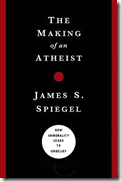
Paperback: 144 pages
Publisher: Moody Publishers (February 1, 2010)
Official Website (Introduction in PDF)
Amazon
Christian Book Distributors
First, I should disclose that I agree with Spiegel’s thesis that “atheism is caused by a complex of moral-psychological factors, not a perceived lack of evidence for God’s existence. The atheist willfully rejects God, though this is precipitated by immoral indulgences and typically a broken relationship with his or her father. Thus, the choice of the atheist paradigm is motivated by non-rational factors” (113-114). I noticed the patterns first in the lives of Nietzsche (whom Spiegel mentions) and Foucault (whom he does not) prior to this reading.
Spiegel expects that the idea will encounter resistance (and it probably will). He compiles previously released information and packages it for popular consumption, drawing significantly from Alvin Plantinga, Antony Flew’s “conversion,” and Paul C. Vitz. In fact, Spiegel does Plantinga the honor of dedicating the book to him as “a gigantic intellect with a humble heart.” Moreover, Spiegel maintains a humble tone throughout which honors Plantinga and is often lacking in apologetics.
Spiegel’s goal is unique. He is not making a case for theism or defending it against the attacks of atheists. His argument is a flanking attack that responds to the “New Atheists” by calling into question the source of their unbelief. Even though they claim their unbelief is rooted in reason, Spiegel sees the rational component of their unbelief secondary to their immorality or broken paternal relationships.
He blends biblical ideas (Romans 1, Ephesians 4, etc.) and virtue epistemological concepts to produce an account of how behaving badly and thinking badly decay into a downward spiral of moral and intellectual blindness (particularly in the areas of ethics, theology, and human nature).
For the link between atheism and broken paternal relationships, Spiegel draws heavily on Paul C. Vitz’s Faith of the Fatherless. “The lack of a good father is a handicap when it comes to faith (70),” but not an insurmountable barrier. While this link will likely be unpopular or attacked as irrelevant on ad hominem grounds, let’s not forget that non-theists have already applied similar psychoanalytical criticisms against theists. Furthermore, enough examples are given to give us pause to reconsider the role of a paternal relationship in shaping our perceptions of God.
I think the value of this book is really threefold. First, it helps encourage believers that matters of belief and unbelief are not purely a matter of the intellect, but are issues of the heart and will. Secondly, it should remind believers to be sensitive to the things which may be going on in the hearts of the unbelievers they want to reach with the gospel. Thirdly, it is a call to unbelievers to consider non-rational factors that may be barriers to their belief in God.
It is a witty, quick read and is worth the couple of hours invested. I hope it is read by many. If you are strapped for time, but the concept interests you, please check out the author’s blog post on the topic here.
– Reviewed by (polymath) Adam Reece







![Reblog this post [with Zemanta]](https://i0.wp.com/img.zemanta.com/reblog_e.png)




